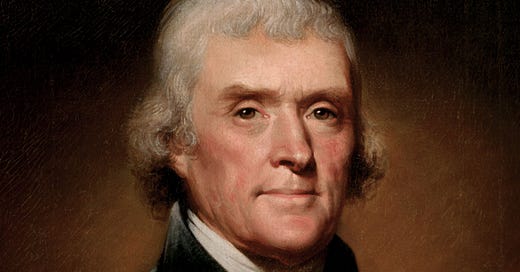INTRODUCTION
Now that we are close to electing a new president, looking to one of the United States' early founders for wisdom on becoming educated and informed to prepare ourselves to vote is important. The next four years and beyond will depend on whom we elect together.
THOMAS JEFFERSON SPEAKS TO US
Thomas Jefferson, a founding father of our country and the principal author of the Declaration of Independence was a strong advocate for education and an informed citizenry. Jefferson believed that the strength and continuity of democracy hinged on the education of its citizens, which in turn led to greater prosperity and equality. His teachings regarding education's critical role in sustaining a democratic society are timely and worth revising since they underline several core principles he developed and espoused throughout his lifetime that have survived the passing of time.
Jefferson’s solid belief in the importance of education can be traced back to his background. He was born into a well-to-do family and had access to a comprehensive education that shaped his intellectual pursuits. He valued knowledge and was a lifelong learner, appreciating the power that education could confer on individuals and society.
In his writings, Jefferson proposed and emphasized that an educated citizenry was pivotal for a functioning democracy. He wrote, “If a nation expects to be ignorant and free, in a state of civilization, it expects what never was and never will be.” This assertion underlines the necessity of education as a fundamental component of freedom and civic responsibility.
In Jefferson's view, an informed citizenry would lead to a more responsive government representing people’s needs and wants. He argued that knowledge helps foster critical thinking, enabling citizens to make informed voting and civic participation decisions. Without education, Jefferson warned, citizens could easily succumb to manipulation, oppression, and tyranny. An educated populace equips individuals with the tools necessary to question authority when needed, critically and constructively evaluate government actions, and defend one’s rights, thus promoting democratic principles.
Most important, Jefferson recognized the link between education, economic prosperity, and social equity. He firmly believed that education should be accessible to everyone, not just the elite. He championed the importance of public schools and education for all. He envisioned a society where individuals from diverse backgrounds could elevate their social and economic status. Jefferson once remarked, “Enlighten the people generally, and tyranny and oppression of body and mind will vanish like evil spirits at the dawn of day.”
He saw the education of all people as the vehicle for social equity, providing individuals, regardless of economic background, with the knowledge to improve their circumstances and contribute to the common good. He also saw the need to cultivate a civic virtue that could flourish through education.
He proposed that citizens should be knowledgeable and possess a sense of responsibility toward their community. An educated citizenry would understand their role in shaping policy and fostering societal well-being. This sense of duty is crucial for a healthy democracy, where citizens are not passive recipients of information but active political participants.
Jefferson’s vision entailed individuals taking initiative in their communities, engaging in public discourse, and holding their leaders accountable. Jefferson took significant steps to translate his vision into practice during his lifetime. He helped establish the University of Virginia in 1819, which was designed to promote education that would promote independent thinking and civic engagement. The University embodied Jefferson’s philosophical belief that education was essential for personal and societal development. By emphasizing a curriculum that valued reasoned debate and inquiry, he sought to produce graduates who would understand their role as caretakers of democratic values and governance.
Despite Jefferson’s progressive views on education, it is essential to review the contradictions in his life, particularly those concerning slavery and equality. Even though he promoted the ideals of liberty and equality, Jefferson was a slave owner, which raised many questions about his various proposals and his vision of an educated citizenry. Scholars see in his writings a tension between his beliefs and the reality of the societal structure that marginalized groups of people.
To fully realize Jefferson’s vision, one must consider the need for inclusive education that dismantles systemic inequalities. Education must extend beyond the confines of formal instructions to challenge societal norms and promote justice for all individuals, regardless of race, origin, or socioeconomic status.
Conclusion
Thomas Jefferson’s teachings underscore the imperative that a well-informed citizenry is essential to perform the civic duty of voting in an election. Being well-informed is the cornerstone of a thriving democracy. Democracy thrives when we are all well educated and informed, we are respectfully engaged with each other, we challenge what we see around us and what our elected officials do or fail to do, and we act to ensure that the government remains accountable to the people.
As we navigate our many contemporary challenges, we must recognize the wisdom we can get from returning and reacquaint ourselves with the teachings of our founding fathers, particularly Thomas Jefferson. Despite his many failures and personal struggles, his educational teachings remain relevant. It is the most promising path to a more equitable culture in which we all engage in a high frequency of prosocial behavior, which benefits the culture. The struggle for an informed citizenry continues to be the cornerstone of upholding the values of democracy and justice in our complex and ever-evolving world. Unfortunately, it remains unfulfilled after so many years since Jefferson proposed them.
Thank you and please pass it on.





